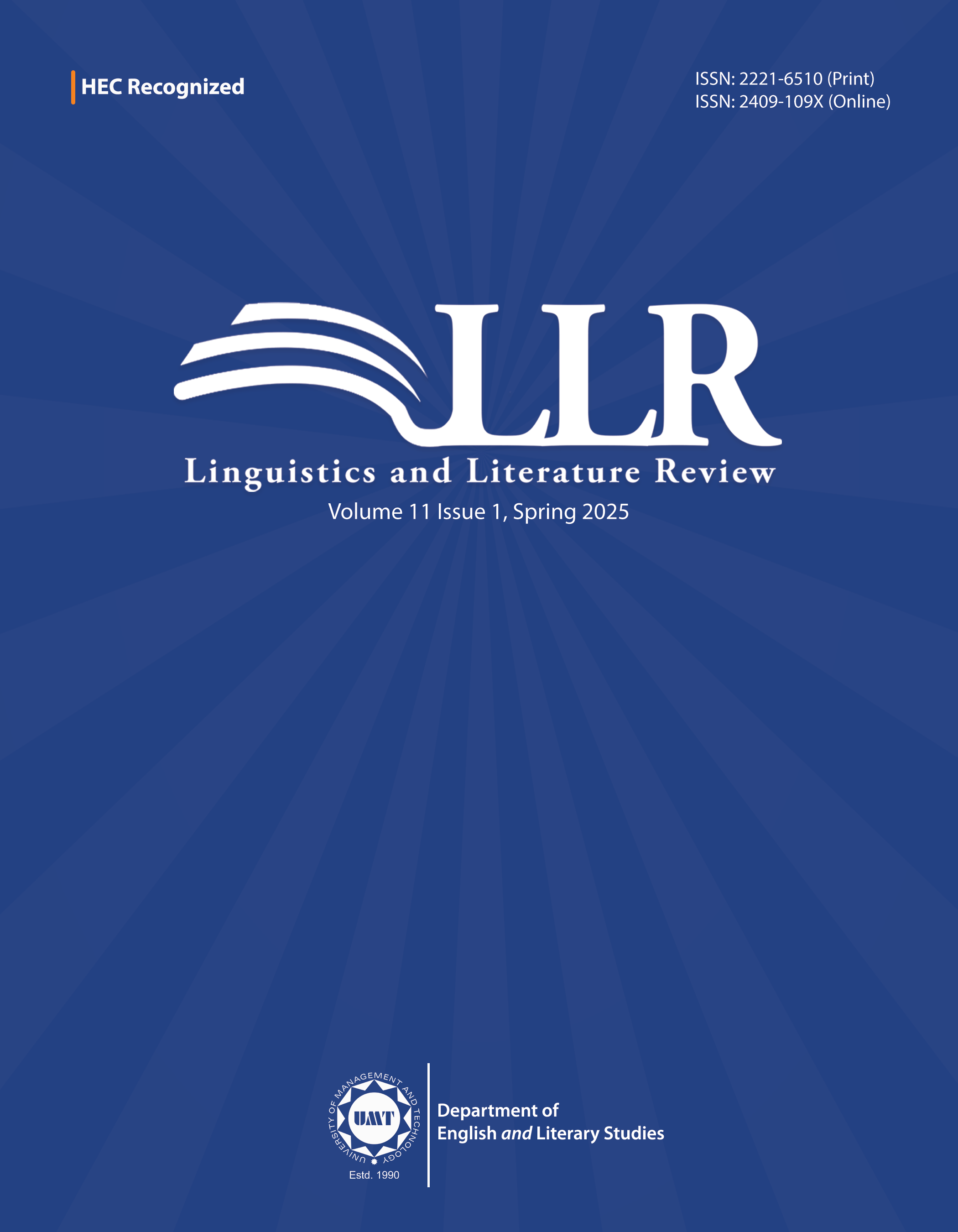Symbiosis of Nature and Ethical Consciousness: Eco-Buddhist Themes in Kaleem Omar’s Poetry
Abstract
 Abstract Views: 0
Abstract Views: 0
This paper analyzes the intersection of ecological awareness and literary expression in Kaleem Omar’s poetry set against the backdrop of Pakistan’s heightened vulnerability to climate change and environmental degradation. It is an endeavour to view South Asian literature through the lens of an indigenous environmental theory, i.e., Eco-Buddhism, to highlight its ecological undertones. Employing Eco-Buddhism as a theoretical framework, the paper conducts a thematic content analysis of Kaleem Omar’s selected poems. These poems have been analyzed to unravel the subtle dynamics between human activities, natural environments, and the ethical considerations entwined in them. His poetry reflects a profound engagement with environmental issues, articulating concerns about societal indifference and the moral complexities of human dominion over nature. In his poems, he views nature as a sacred being that must be revered and conserved. By integrating the Buddhist ethos of interconnectedness and non-violence with the concerns of ecocriticism, this research underscores the potential of South Asian Eco-poetic narratives in advocating environmental consciousness and addressing ecological crises.
Downloads
References
Ali, H. (2022, September 14). Pakistan’s floods are a wind from the West. The Nation. https://www.thenation.com/article/world/pakistan-floods/.
Buell, L., Heise, U. K., & Thornber, K. (2011). Literature and Environment. Annual Review of Environment and Resources, 36, 417–440. https://doi.org/10.1146/annurev-environ-111109-144855
Cavanagh, S. (1997). Content analysis: Concepts, methods and applications. Nurse Researcher, 4(3), 5–16.
Cole, F. L. (1988). Content analysis: process and application. Clinical Nurse Specialist, 2(1), 53–57.
Glotfelty, C., & Fromm, H. (Eds.). (1996). The ecocritical reader: Landmarks in literary ecology. University of Georgia Press.
Harris, I. (1995). Getting to grips with Buddhist environmentalism: A provisional typology. Journal of Buddhist Ethics, 2, 173–190.
Hasnain, K., & Gabol, I. (2023, October 30). Come winter, come smog: Lahore becomes world’s most polluted city with worst air quality. Dawn. https://www.dawn.com/news/1784821
Henning, D. H. (2002). Buddhism and deep ecology. AuthorHouse Publishing.
Kaushik, K. (2023, March 14). Lahore is most polluted city, Chad worst among countries – survey. Reuters. https://www.reuters.com/business/environment/lahore-is-most-polluted-city-chad-worst-among-countries-survey-2023-03-14/
Khan, S., & Siddique, J. (2023, June 9). Why Pakistan is drowning. United States Institute of Peace. https://www.usip.org/publications/2022/09/why-pakistan-drowning
Loy, D. (2019). Ecodharma: Buddhist teachings for the ecological crisis. Simon and Schuster.
Omar, K. (1975). Wordfall: Three Pakistani poets. Oxford University Press.
Oppermann, S. (2006). Theorizing ecocriticism: Toward a postmodern ecocritical practice. Interdisciplinary Studies in Literature and Environment, 13(2), 103–128.
Otto, F. E., Zachariah, M., Saeed, F., Siddiqi, A., Kamil, S., Mushtaq, H., Arulalan, T., AchutaRao, K., Chaithra, S. T., & Clarke, B. (2023). Climate change increased extreme monsoon rainfall, flooding highly vulnerable communities in Pakistan. Environmental Research: Climate, 2(2), Article e025001. https://doi.org/10.1088/2752-5295/acbfd5
Shabbir, W., Omer, T., & Pilz, J. (2023). The impact of environmental change on landslides, fatal landslides, and their triggers in Pakistan (2003–2019). Environmental Science and Pollution Research, 30(12), 33819–33832. https://doi.org/10.1007/s11356-022-24291-z
Shamsie, M. (Ed.). (1997). A Dragonfly in the Sun: An anthology of Pakistani writing in English. Oxford University Press.
Sullivan, M. (2015). Nature's nothingness: Holistic eco-Buddhism and the problem of universal identity. Journal of Buddhist Ethics, 22, 285–318.
Vimal, J., & Subramani, R. (2017). Understanding qualitative content analysis in the light of literary studies. Language in India, 17(3), 478–488.
Worster, D. (1996). The two cultures revisited: Environmental history and the environmental sciences. Environment and History, 2(1), 3–14. https://doi.org/10.3197/096734096779522446

This work is licensed under a Creative Commons Attribution 4.0 International License. Authors retain copyright and grant the journal right of first publication with the work simultaneously licensed under a Creative Commons Attribution (CC-BY) 4.0 License that allows others to share the work with an acknowledgment of the work’s authorship and initial publication in this journal.







